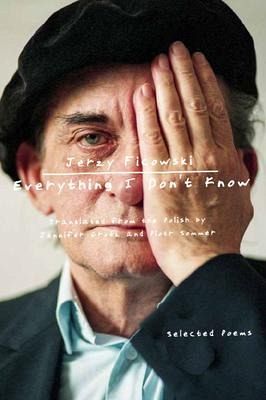Nicht lieferbar

Everything I Don't Know
Versandkostenfrei!
Nicht lieferbar
"These surprising, clear, and appealing poems are to be enjoyed again and again, marking Ficowski as a poet readers won't want to miss."--Publishers Weekly (starred review) "What good luck to finally have in English the writings of the brilliant Jerzy Ficowski, the poet who lived at least seventeen lives, fighting in the Warsaw Uprising, and later traveling for years with the Roma people through the roads of Poland, opposing his government, and watching the authorities ban his poems, a poet who translated from Spanish and Romanian and Yiddish and Roma, but most of all from the tongue of silenc...
"These surprising, clear, and appealing poems are to be enjoyed again and again, marking Ficowski as a poet readers won't want to miss."--Publishers Weekly (starred review) "What good luck to finally have in English the writings of the brilliant Jerzy Ficowski, the poet who lived at least seventeen lives, fighting in the Warsaw Uprising, and later traveling for years with the Roma people through the roads of Poland, opposing his government, and watching the authorities ban his poems, a poet who translated from Spanish and Romanian and Yiddish and Roma, but most of all from the tongue of silence ... Beautifully translated by Jennifer Grotz and Piotr Sommer, these poems also document the tragedy of the Holocaust, with the direct and uncompromising voice with which he reminds us of the great poets such as R--żewicz and Świrszczyńska, while remaining, all the while, himself. Read a piece such as 'I was unable to save / a single life' in a bookstore, and I guarantee you will want to take this book with you, to keep it for the rest of your life."--Ilya Kaminsky "Thanks to these brilliant, careful, inspired translations, we can now read Jerzy Ficowski, one of Poland's best kept secrets. This book is a marvel in its weird clarity and extraordinary range of styles and subjects, from the perfectly unassuming paradox of the title, all the way through to its final poems about bumblebees and Satie and mother nature, who scratches herself and 'shudders / with a tsunami.' How fortunate we are to have the unassailable evidence that all along, there was yet another genius of 20th century Polish poetry."--Matthew Zapruder Everything I Don't Know is a sprawling and generous sampling of a life's work, and Ficowski's deft prose documents more than a review could ever hope to fully catalog ... Ficowski was a poet of the quotidian, a post-war poet, a lyric poet, a careful observer of both the mundane and those things which are most grave. His work is worth reading, re-reading, canonizing ..."-- Zoe Contros Kearl, Action Books Micro Reviews Poetry. Jewish Studies.



